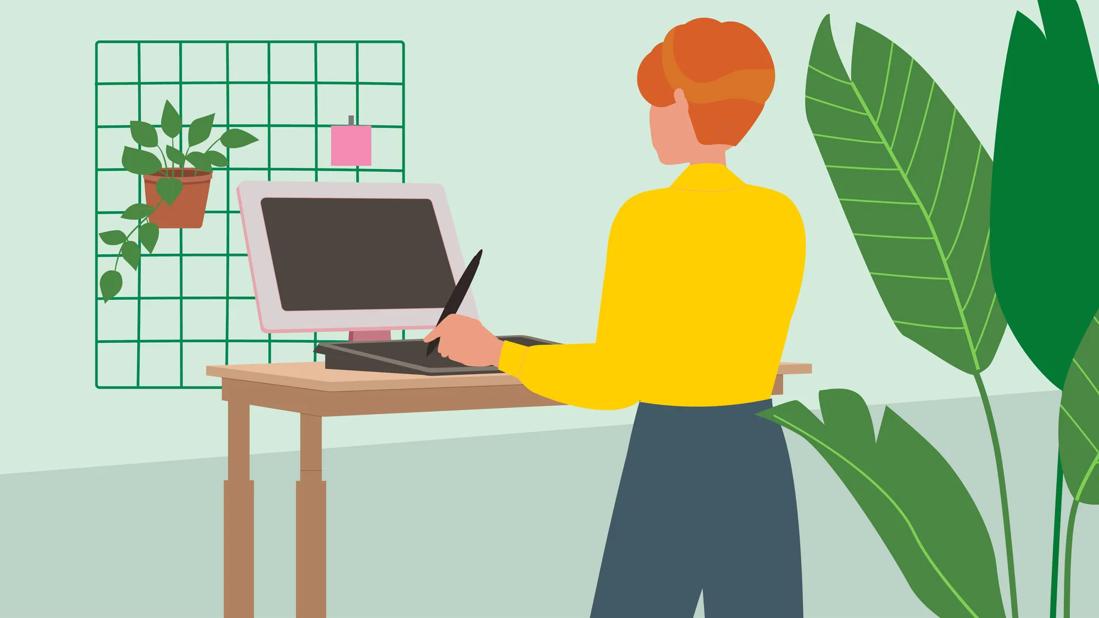Taking a stand throughout the day can lower your risk of disease while improving your energy, focus and productivity

Image content: This image is available to view online.
View image online (https://assets.clevelandclinic.org/transform/46b34fff-f924-4046-b1b2-e5d6401048a1/standing-desk-1502975695)
Person working on computer at a standing desk
For those of us who spend a lot of time sitting in front of computer screens or lounging on the couch at home, a standing desk can offer a small solution to switching up a sedentary lifestyle. And that’s a good thing, considering our bodies experience negative effects when we sit for too long.
Advertisement
Cleveland Clinic is a non-profit academic medical center. Advertising on our site helps support our mission. We do not endorse non-Cleveland Clinic products or services. Policy
Occupational therapist Michael Milicia, OT/L, gives a standing ovation for standing desks and how they might benefit your overall health, wellness and productivity.
Some standing desks stay put (stationary) at fixed heights, while others can move up and down based on your personal preferences. And while you probably can’t completely get away from sitting at your desk (or at least sitting for some parts of your day), there are some benefits to taking the occasional stand with a standing desk, countertop or other firm surface.
“Some research suggests that people who sit excessively have increased risk for obesity, diabetes and heart disease,” says Milicia. “Even if you’re actively working, usually, your lower body is relatively static. Less movement leads to decreased circulation and more aches and pains. But standing and moving more often can help improve all of those things.”
A more active lifestyle (like exercising regularly or standing more often) can lead to improved mood and increased energy.
Research from 2022 saw moderate improvements in fatigue, which resulted in increased ability to finish tasks. A 2023 study also found that standing for two hours after a meal increased energy output without affecting blood sugar metabolism.
Advertisement
“You don’t have to stand for two hours to experience these benefits,” clarifies Milicia. “Just taking small breaks throughout the day to stand, stretch and walk around can have a significant impact on your health and comfort level.”
Studies show that as work-related sitting decreases and the more you stand, it can positively affect your ability to focus on completing tasks. In some ways, taking a moment to stand offers you an opportunity to reset your brain, which works really well for people living with ADHD. But to be honest, we could all benefit from a little more productivity.
Standing desks and active workstations (like using a treadmill or cycle while working) can have a positive impact on overall energy and physical activity for people living with overweight or obesity.
“Exercise and activity level (or movement in general) is one of the most dramatically modifiable risk factors that individuals can change,” says Milicia. “Studies show that standing and moving more throughout the day will positively impact your health.”
Sitting for long periods of time can reduce blood flow, especially to your legs and feet. Over time, this can have widespread effects on your heart and cardiovascular system.
Research shows that when you significantly stand more often, you experience improvements in blood flow and insulin resistance, which could lead to Type 2 diabetes if left unmanaged.
When you sit for a long duration, you tend to round your back or collapse over your keyboard. But having increased opportunities to stand (along with an ergonomic office setup) can improve your posture, working comfort and work tolerance over time.
Better alignment equals fewer body aches — especially for your lower back. Long-term sitting can put a lot of strain and pressure on those nerves, leaving you feeling stiff and/or in pain. So, taking mini breaks to stand, stretch or exercise throughout the day can help alleviate some of those issues. Even seated desk exercises can go a long way.
At the end of the day, the more active you are, the better you’ll feel. Find small moments to stand up and walk away from your work to refocus your mind and body. Or consider doing some aspects of your job — like taking phone calls or joining meetings — while standing.
Whether you use a standing desk, go for a walk or do some yoga, you’ll feel more relieved and satisfied when you give your body the opportunity to stand up for what you need most.
Advertisement
Advertisement

Sign up for our Health Essentials emails for expert guidance on nutrition, fitness, sleep, skin care and more.
Learn more about our editorial process.
Advertisement
Try breaking down tasks into manageable to-do lists and relying on time management techniques
Working beyond your limits can increase illnesses and accidents related to your physical and mental well-being
Help calm the angst that can come with the start of a new work week by adopting a positive mindset, planning an activity and getting some exercise
A hostile work environment can foster a culture of aggression, doubt and negativity that’s harmful to your health and success
Not having paid sick leave, working night shifts and lacking consistency in schedule or pay can cause serious psychological distress
Schedule breaks, stand and stretch, and rely on alarms, to-do lists and other tools to help keep you focused
Work burnout can leave you exhausted and frustrated at work and beyond, but you can beat it by setting boundaries and surrounding yourself with positivity
Decide what you’re OK sharing, respect others and speak up if you feel uncomfortable
Although it could be used as a moisturizer, this new trend is not recommended
Communicating clear limits helps protect your time, energy and emotional well-being
High cholesterol can be genetic, but testing and treatment can lower your heart disease risk